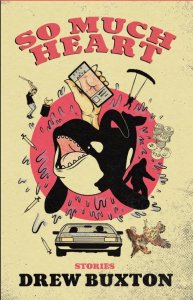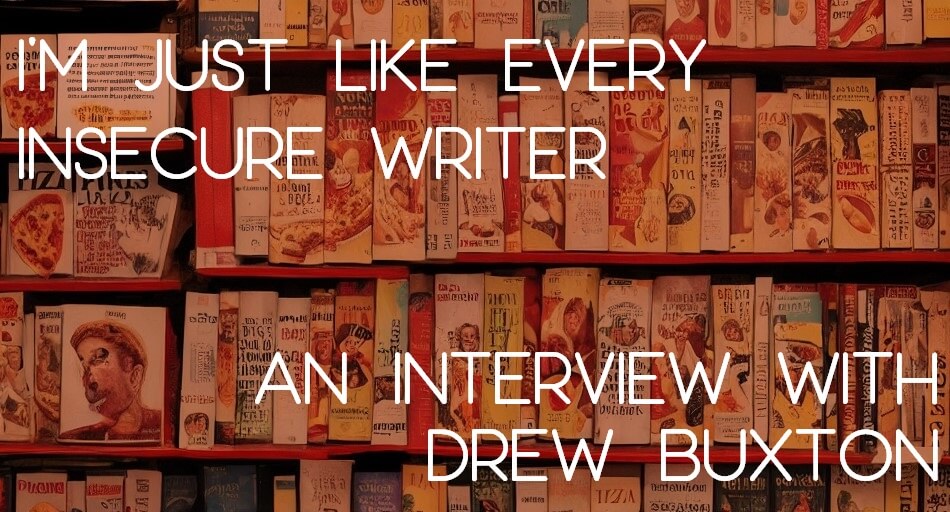 Drew Buxton tickles the underbelly of a wired and tired America. Dosed up on cheap food, broken dreams and pop culture, the characters who populate Buxton’s debut short story collection So Much Heart (With an X Books, 2023) possess awkward hearts, hearts beating to endure dead end lives, sent arrhythmic by the invasion of the strange into the status quo. These are stories submerged in substance abuse and misuse, invigorated by chance encounters with the weird, possessed of a wry amusement. Buxton’s America is a place where the unusual is made usual, as a reminder that any hardship worth a thing will be accompanied by an absurd twist.
Drew Buxton tickles the underbelly of a wired and tired America. Dosed up on cheap food, broken dreams and pop culture, the characters who populate Buxton’s debut short story collection So Much Heart (With an X Books, 2023) possess awkward hearts, hearts beating to endure dead end lives, sent arrhythmic by the invasion of the strange into the status quo. These are stories submerged in substance abuse and misuse, invigorated by chance encounters with the weird, possessed of a wry amusement. Buxton’s America is a place where the unusual is made usual, as a reminder that any hardship worth a thing will be accompanied by an absurd twist.
REBECCA GRANSDEN: In “Lexapro” your characters face navigating a multitude of challenges relating to mental health and a system seemingly ill-equipped to deal with their needs. Your bio mentions a history in social work. How would you say being involved in that field has influenced your writing?
DREW BUXTON: I don’t know that it’s influenced my writing that much. I’ve worked with a ton of different populations, so maybe it’s just given me a better understanding of people and the world in general. It definitely gives some balance to my life. I’ll be worked up and in the middle of writing something, but I’ll know I have work coming up, so I need to slow down and take a break, make sure I’m rested and in a good place to go into work. Boring answer, haha!
RG: “So Much Heart” addresses phenomena embedded in modern American folklore, such as UFOs and Bigfoot, as well as the folk hero D. B. Cooper. The story is particularly successful at capturing that state in youth when the strange and mysterious evokes a type of endless possibility. Did your own childhood contain any fascinations with the weird or eerie? Were there local stories that captivated you? Have you ever had an experience with something unexplained?
 DB: I watched a ton of TV growing up, and one of my favorite shows was Unsolved Mysteries with Robert Stack. It terrified me, but I loved that rush of being scared. I really wanted Bigfoot and the Loch Ness Monster to be real (and still do). It seemed possible back then. I wanted D.B. Cooper to have survived and those guys who escaped from Alcatraz to have made it to the shore. The uncertainty of it all is so appealing. I never get sick of these tales and legends because of their open-endedness. I think it might all be ruined a little bit if we found out, for example, who D.B. Cooper was and what happened to him. In South Texas, people joke about Chupacabra, and there was this thing near San Antonio when I was in high school called the Elmendorf Beast that killed livestock. It turned out it was just a coyote with mange.
DB: I watched a ton of TV growing up, and one of my favorite shows was Unsolved Mysteries with Robert Stack. It terrified me, but I loved that rush of being scared. I really wanted Bigfoot and the Loch Ness Monster to be real (and still do). It seemed possible back then. I wanted D.B. Cooper to have survived and those guys who escaped from Alcatraz to have made it to the shore. The uncertainty of it all is so appealing. I never get sick of these tales and legends because of their open-endedness. I think it might all be ruined a little bit if we found out, for example, who D.B. Cooper was and what happened to him. In South Texas, people joke about Chupacabra, and there was this thing near San Antonio when I was in high school called the Elmendorf Beast that killed livestock. It turned out it was just a coyote with mange.
RG: Stumbling across a corpse occurs at least twice in the collection. What is the worst smell you’ve ever experienced?
DB: It’s gotta be the time something died in the walls of the house I was living in. There was also this time I walked into a Whataburger bathroom that still haunts me to this day.
RG: Many of your characters struggle with money. Over what time scale did you write the stories featured, and did wider societal trends influence you in any way?
DB: I only noticed that when I started putting the stories together as a book. The characters’ lack of money usually just stems from the story’s initial premise. Like in the title story, I wanted a kid to find D.B. Cooper’s ransom and for it to be significant to him. I’m obsessed with writing about small-time schemes, so naturally, these characters aren’t going to be well-off.
I’ve been writing these stories for years. A lot of them were first written when I had little understanding of storytelling. I’d have an idea I was excited about but lack the capacity to execute it. The older stories, I’ve rewritten countless times. The newer ones like “Lexapro” and “Ride With Me” came a little easier.
RG: Your stories are often characterized by unusual juxtapositions. In “Monticello” an ordinary school environment is overtaken by the insidious creep of opioid use among the teachers. Could you elaborate on this story’s themes and how it came about?
DB: I was raised by a single father who is great and totally reasonable, but I’ve always wondered if he wasn’t—how screwed I’d be. I think we’ve all known certain people and then learned they have kids and thought, “Poor fucking kids.” Parents obviously shape so much of their kids’ beliefs, but with a single parent, you’re getting everything from this one source, and it’s a total crapshoot. Dessie is a brilliant child, but his father’s sway over him is so strong. I think certain people in our lives live in our heads. We know what they’d say in a certain situation even if they’re not there. Even if they’re dead, we still hear them.
RG: “Always Be My Baby” makes reference to therapy, pop psychology and self help. What is your relationship to, or opinion of, the self help industry?
DB: It’s pretty embarrassing, but I got kinda into the law of attraction and manifestation stuff, haha. I was taking a lot of psychedelics and looking for answers! Sometimes I still believe in it but only for bad stuff. Like, I’ll have intrusive thoughts and ruminate about something bad happening, then worry I’m going to make it happen. I think life is incredibly complex and we constantly have to make difficult decisions. The idea that life is actually very simple will always be appealing. I was raised Baptist and am no longer religious, but it still holds a certain appeal. I’m writing a novel right now with a  Tony Robbins-esque character, and I recently watched the Netflix documentary about him. The pop psychology/self-help industry is full of charlatans, obviously, but he’s harder to pin down for me. I think he’s definitely part huckster and has narcissistic qualities, but a lot of people say he’s saved their lives. Who am I to say that’s not real?
Tony Robbins-esque character, and I recently watched the Netflix documentary about him. The pop psychology/self-help industry is full of charlatans, obviously, but he’s harder to pin down for me. I think he’s definitely part huckster and has narcissistic qualities, but a lot of people say he’s saved their lives. Who am I to say that’s not real?
RG: Mariah Carey’s “Hero” plays a significant role in the story. Are there any songs from your own life that stand out to you as being touchstones, or associated with a particular time or event?
DB: I had a stepmom for a few years when I was little, and she would only let us listen to Christian music. She threw away our MC Hammer tape because it said “ass” or “hell” or something. We listened to Christian groups like DC Talk and Audio Adrenaline and got really into them. They’re really funny to listen to now, but it definitely takes me back to that time living with my stepmom and stepbrother.
RG: Everyone knows, or has been, an Eric, as portrayed in “Inside Recess.” The kid that does things a little bit, or a lot, wrong, but is memorable for it. Is Eric drawn from a real life example? Looking back at the collection as a whole, are there characters that stand out to you? Were any characters particularly enjoyable to write, or, alternatively, more challenging to tackle?
DB: There was really a guy in my fourth-grade class who brought in a K’NEX roller coaster and got a little power-drunk about it. I have a specific memory of him “firing” a kid from the project. I talked to him on Facebook a few years ago, and he seems like a cool guy now.
I really enjoyed the narrator in “Ride With Me.” There is such freedom to digress when using first-person, and once you establish that character’s unpredictability, there are so many directions you can take.
RG: “Ride With Me” makes reference to the Serial podcast. What is your relationship to the true crime genre?
DB: I love true crime content. Me and my girlfriend fall asleep to Dateline most nights. I have really fond memories of listening to Serial that summer it came out. I’d eagerly wait for each episode then get a little stoned and walk around my neighborhood late at night and listen to it. Every little sound or movement outside would scare me. Again, the weird joy in being scared and the uncertainty. The thing about the true crime craze that bothers me is when people pretend the shows and podcasts are about justice or some other grand idea. It’s just voyeurism, and that’s okay! Just own your voyeurism!
RG: Favorite and least favorite pizza toppings, and dip choice?
DB: I recently switched from Papa John’s to Domino’s even though I miss getting that big cookie they have at Papa John’s. Domino’s has this cookie-brownie hybrid thing that’s decent. Their pizza is great now though. I go with pepperoni, bacon, pineapple, and jalapeno.
 RG: Do you ever imagine how a reader might react to your writing? Do you have any hopes or expectations for the collection? Which story from the collection would you recommend to someone who has not read you before?
RG: Do you ever imagine how a reader might react to your writing? Do you have any hopes or expectations for the collection? Which story from the collection would you recommend to someone who has not read you before?
DB: I’m just like every insecure writer who wants their work to be read and loved and is scared it might offend people. I’d love for someone to read it and think, though it has similar elements to other stuff they’ve read, that they’ve never read anything just like it. I’m not one of these people that thinks art is a powerful force for change, but I hope “Lexapro” helps a few people understand OCD better or resonates with people who also have the disorder.
Read “Burl” from our archives.

